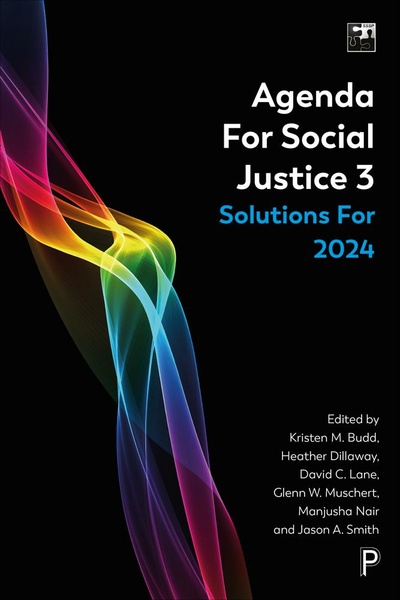Agenda for Social Justice
President's Welcome
This volume exemplifies the mission of the Society for the Study of Social Problems to create rigorous empirical research that can be marshaled to solve the most pressing social problems facing society today. This volume focuses on a variety of institutions and issues including the criminal justice system and mass incarceration, health care, along with reproductive and transgender justice, education, immigration, housing and climate. The chapters examine how ideological and structural systems of racism, xenophobia, and transphobia shape these institutions, policies, and practices. By understanding the cultural and structural underpinnings of systems of inequality and domination, this research can be used to understand and ultimately reduce inequality, violence, and poverty. As social scientists, we can provide the building blocks for understanding complex systems of power and domination. Thus, this book exemplifies the best that emancipatory social science has to offer, not only identifying and understanding social problems but using empirical research to advance progressive social change.
Mary Bernstein, University of Connecticut
SSSP President, 2023-2024
The Agenda for Social Justice 3: Solutions for 2024 provides accessible insights into some of the most pressing social problems and proposes public policy responses to those problems.
Written by a highly respected team of authors brought together by the Society for the Study of Social Problems (SSSP), the book offers recommendations for action by elected officials, policymakers and the public regarding key issues for social justice. Chapters include discussion of social problems related to criminal justice, the economy, food insecurity, education, healthcare, housing and immigration.
The book will be of interest to scholars, practitioners, advocates and students interested in public sociology, the study of social problems and the pursuit of social justice.

Access Options
The Agenda for Social Justice 3: Solutions for 2024 is now available for wide public distribution
As a benefit for all current SSSP members, a gratis electronic copy of the Agenda for Social Justice 3: Solutions for 2024 is provided. You will be required to log in using your e-mail and password. If you have forgotten your password, you may enter your e-mail address below the login area, and your password will be e-mailed to you. If you have recently changed your e-mail address, you will need to login using the address SSSP has on file for you. If you have any questions or need assistance, please contact SSSP at sssp@utk.edu.

Purchasing Options
The Agenda is available in hard copy and e-reader versions for a nominal fee. Please consider purchasing the Agenda to support the SSSP!
Policy Press purchasing information
Table of Contents
Editors: Kristen Budd, Heather Dillaway, David Lane, Glenn Muschert, Manjusha Nair and Jason Smith
| Front Matter |
|
President’s Welcome |
| PART I Crime, law, policy |
|
Chapter 1. From blame to criminalization: Black motherhood and intimate partner violence Sarah Jane Brubaker |
|
Chapter 2. Curbing pretextual traffic stops to reduce racial profiling |
|
Chapter 3. Pay to talk: the financial barriers, consequences, and solutions to prison and jail communication |
|
Chapter 4. Immigration enforcement: the impact of crimmigration on mixed- immigration- status families in the US and the need for reform |
|
Chapter 5. News media and the crime coverage problem |
|
PART II Education |
|
Chapter 6. Caught in the crossfire: K- 12 education and anti- CRT measures |
|
Chapter 7. Inequality in the experiential core: using pathways to understand and improve college students’ journeys |
|
PART III Food insecurity |
|
Chapter 8. Addressing food insecurity through community- informed food retailer implementation |
|
Chapter 9. How inflation and food deserts made a bad poverty measure worse— and what we can do about it |
|
PART IV Health and healthcare |
|
Chapter 10. Reproductive health in crisis: access to abortion and contraception in the US |
|
Chapter 11. A bold policy agenda for improving immigrant healthcare access in the US |
|
Chapter 12. Gender- affirming healthcare for transgender and gender minority youth |
|
Chapter 13. At the nexus of reproductive and juvenile (in)justice: the (re)production of sexual and reproductive health disparities for system- impacted Black girls |
|
Chapter 14. Centering racial justice in the US emergency response framework |
|
PART V Housing insecurity |
|
Chapter 15. Affordable housing in America: a matter of availability, access, and accountability |
|
Chapter 16. Shelter from the storm: a framework for housing and climate justice |
| PART VI Looking forward |
|
Chapter 17. Social problems in the age of culture wars |
| Afterword Elroi J. Windsor |
Endorsement
“The Agenda for Social Justice 3 is an amazing example of emancipatory social science. It shows how sociological tools can be serve social change and alleviate social problems.” Morena Tartari, Northumbria University
